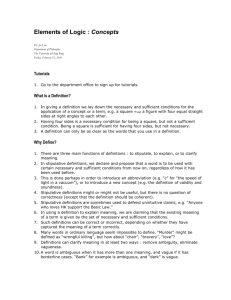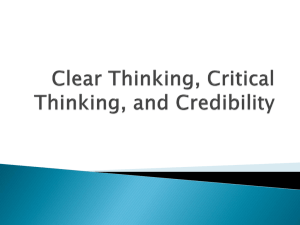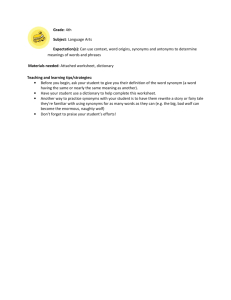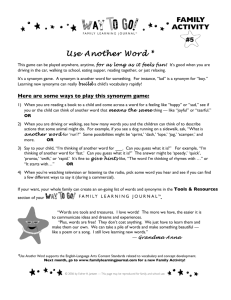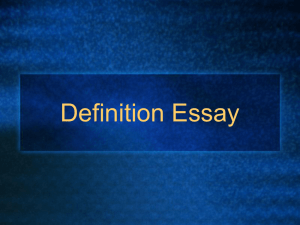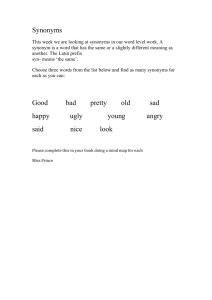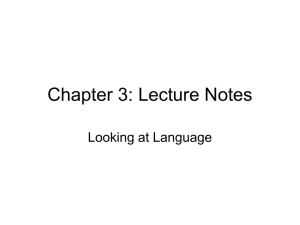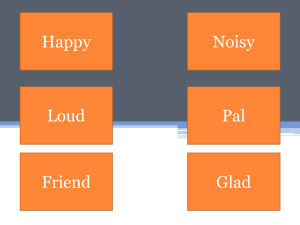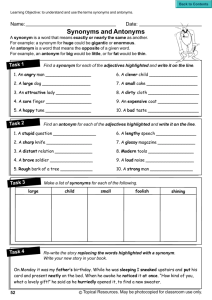Language and Definition
advertisement
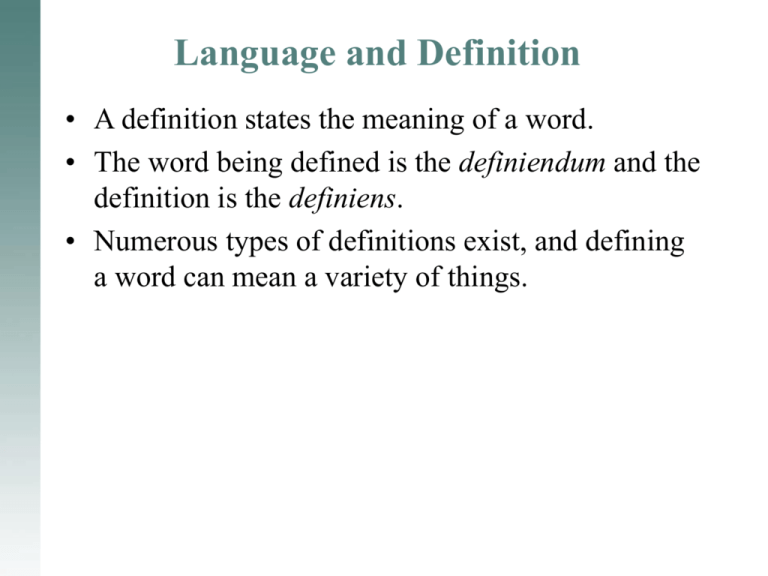
Language and Definition • A definition states the meaning of a word. • The word being defined is the definiendum and the definition is the definiens. • Numerous types of definitions exist, and defining a word can mean a variety of things. Definitions • Are definitions a help or a hindrance in understanding our world? • One school of thought maintains that by defining things we separate then into discrete parts when in fact the world is continuous, a seamless cloth. • The idea is that when we define an object we artificially snip off pieces from the endlessness of reality in order to make it manageable, but something of the object’s essence becomes lost when we try to harness it by forcing it into the limits of a definition. • H.G. Wells once remarked, “The forceps of our minds are clumsy forceps and crush the truth a little in taking hold of it.” Definitions II • However, we do know that to think without language is extremely difficult, but with a set of defined words we can conceive and imagine things almost without limits. • Overall, definitions enrich our understanding. Stipulative Definitions • Stipulative definitions - to introduce unusual or unfamiliar words, to coin new words, or to introduce a new meaning to a familiar word. • Stipulative definitions come in two varieties, arbitrary and restrictive. • In the arbitrary type people stipulate that, for their purposes, an invented word will henceforth carry a particular meaning. – For example, Sigmund Freud invented three terms to stand for the fundamental energy systems of the psyche: The “id” represents primal upsurging desires; the “ego” means control by rationality and realism; and the “superego” means the internalized social rules, manifested chiefly in the form of conscience. Stipulative Definitions II • In the category of arbitrary stipulative definitions are also acronyms, or words formed from the initial letters of a phrase. • We speak, for example, of “NASA,” National Aeronautics and Space Administration or “NASCAR,” National Association of Stock Car Auto Racing. • Many words begin as acronyms, and if they become assimilated into the culture, the original words that made them up are lost. Stipulative Definitions III • The second type of stipulative definition is a restricting one whereby a person proposes to use an ordinary word in a special, limited, or precise sense. • For example, a legislator may say, “My bill proposes aid for the poor, and by ‘poor’ I mean those with family incomes below $6,000 per year.” Stipulative Definitions IV • Since all stipulative definitions are forewarnings and statements of intent, we can never accuse them of being false; they are, after all, simply proposals. But we can criticize them for being illegitimate. That is, if someone offers a definition that we cannot accept psychologically, a definition that tries to persuade us to accept a peculiar point of view, then it can be criticized as unacceptable. – For example, “Fork: an instrument used chiefly for putting dead animals into the mouth.” - Ambrose Bierce Reportive Definitions • Reportive definitions – in this kind of definition a description is offered of the conventional meaning of a word, and if the description does not match the actual way that the word is used, then the definition is incorrect. • Depending on the accuracy of the survey of the usage, the definition is either true or false. • A reportive definition gives an explanation of the general meaning a word carries for a group of language users. Reportive Definitions II • Sometimes this type of definition is called “lexical” because it is the lexicographer’s or dictionary - maker’s definition . • Although lexicographers usually report how a word is used, sometimes they take on the role of an authority and tell us how a word should be used. This legislative function of dictionaries is more prevalent in countries such as France or Germany where there is greater sensitivity to the corruption of language. In the United States we are more interested in the dynamic growth of English than in its purity. That is why we accept idiomatic expressions and slang so readily; when street language becomes prevalent enough, it is incorporated into the dictionary as common usage. Reportive Definitions III • Although reportive definitions are usually descriptions of how words are currently used, sometimes they will include former usages as explanations of a word’s historical meaning. These past or archaic senses can provide background interest and shed light on a word’s present meaning, however, one should not assume that the original meaning of a word is its real meaning. – For example, “cunning” once meant clever, and a “flasher” was a brilliant person. • Reportive definitions, then, are accounts of the established usage of words, and all dictionary definitions are of this type. Depending on how accurately they reflect actual usage, they can be said to have correct or incorrect definitions. Synonyms • Synonyms constitute a third type of definition, and here another word is offered that has approximately the same meaning as the first. • For example, to define honesty we could list truthfulness, frankness or candor; for humorous we could list funny, comical, or amusing. Of course, the synonym must be a word that is understood, otherwise the meaning of the original word will not be clarified. Thus the effectiveness of a synonym definition depends on the reader’s stock in trade; the larger his or her vocabulary, the more effective the synonym is likely to be in explaining the meaning of a word. Synonyms II • In such definitions the word that is presented as synonymous should be as close as possible in meaning to the word that we are trying to define. No two words will have identical meanings, of course, otherwise they would be the same word and one would drop out of the language as superfluous. Synonyms III • Thesauruses specialize in listing synonyms, and there are dictionaries of antonyms, words with opposite meanings, as well. Any words listed as synonymous would have roughly the same meaning, and they will range from close approximations to words with fairly remote connections. • For example, if we are looking for synonyms for “dog” we might find listed “pooch” and “mutt”. Likewise, synonym definitions for “female”, depending on the context might include “woman”, “lady”, “dame” , “chick”, and so forth. From the array of choices we must select the synonym that best expresses what we wish to convey, because the intension, extension, and connotation are all different. Synonym IV • Synonym definitions are also found very often in bilingual dictionaries when a word is translated from a foreign language to English and vice versa. If we consult a German-English dictionary for the meaning of die Uhr it will be translated as “clock.” Even here, however, a certain caution is necessary to ensure we have equivalencies. A clock in Germany can be what we would call a watch. If we take synonyms at face value, we might misconstrue the meaning because of cultural differences. • Take a sentence or two in English and run it through a translator, such as http://babelfish.altavista.com in German and Spanish and then back to English. How much has been lost in translation? Example Definitions • Example definitions explain the meaning of a word by mentioning some instances of it. In terms of our discussion of extension, they explain a meaning by pointing out some of the members of the class. Once we know the range of things referred to by a term (assuming it is referential), then we have a clearer understanding of its meaning. For instance, an example definition of “bird” might include Robin, Oriole, Blue jay, and so forth. Example Definitions II • Also covered by example definition are descriptions of the sort of experience that is involved. For example, we might explain the meaning of “depressed” as the feeling you get when you’re alone after breaking up with someone you’ve been involved with for a long time. It’s Saturday night, the telephone doesn’t ring, no one knocks on the door, there’s a party next door, and a blues song is playing on the radio. That is being depressed. • We might define “trusting” as disclosing personal secrets, allowing oneself to be vulnerable. Ostensive definition • Sometimes a description of the experience or a catalog of examples is not enough of an explanation, and we can only show the object, event, or characteristics to which a word applies. We have an ostensive definition. • For instance, the best way to explain “red” is to hold up different red objects. To explain “spicy” we might have them taste a spicy food. Some things are first hand experiences, and no description of characteristics will convey the meaning adequately. A person blind from birth will never understand the word “red” except in the descriptive sense. Applications • A stipulative definition should be used if we want to invent a word for something new or to warn someone that we are severely limiting the application of a word. We might use an arbitrary stipulative definition, for example, if we want to tell about some new psychological theory we’ve devised. We might say “I am going to call ‘the Pinnochio syndrome’ the feeling children have that whatever they do wrong will show on their faces.” Or we might say “By ‘medicine’ I mean the cure of disease and the maintenance of health as practiced in Western Science; I am not including faith healing or alternative medicine such as herbal treatment, meditation, massage, or acupuncture.” Applications II • A reportive definition that describes conventional usage is the most common definition used. In presenting some argument about the United States we might want to say, “We are a republic, that is, we have a government in which citizens exercise power through voting and electing representatives responsible to them.” Applications III • We should use a synonym definition if we want to explain the meaning of a word in a way that is quick, direct, and easily grasped. As discussed, we must be reasonably sure that the word we offer as equivalent is something the reader or hearer is likely to know, otherwise it will leave her doubly mystified. • Finally, it is sometimes most effective in defining a word to list some examples of the things the word includes. Avoiding Definition Mistakes • In forming sound definitions, whether stipulative, reportive, synonym, or example, certain standards must be met. These standards make the definition reliable, keep it honest. • Some standards have already been discussed: that stipulative definitions must be psychologically acceptable and that reportive definitions must reflect conventional usage. However, there are additional criteria for acceptable definitions, and they are usually listed as pitfalls to avoid. Circularity • Definitions should not be circular. A circular definition usually repeats the defined word in the definition. To define “cookbook” as “a book used to cook” is not very informative. A definitions is also circular when it defines two words in terms of each other. For example, “A cause is that which produces an effect” and “An effect is that which results from a cause.” These definitions are just going around in circles. Definitions that are too broad or too narrow. • Another trap to avoid is having definitions that are too broad or too narrow. If our definition is unduly broad it will cover too much, failing to rule out things that are extraneous. If it is too narrow it will cover too little, excluding things that should be included within the term. • For example, President Clinton’s definition may have been too narrow when he stated, referring to Monica Lewinsky, “I did not have sexual relations with that woman as I interpret the term”. On the other hand, to define “music” simply as sound would qualify the noise of jackhammers, sirens, and traffic as different kinds of music. Metaphorical definitions • Metaphorical definitions should be avoided. In poetic discourse metaphors and similes, images and symbols, are the life blood of the art, but in formulating definitions, where clarity and directness are critical, such language should be avoided. It is unilluminating to define a “saint” as “a dead sinner, revised and edited,” or “happiness” as “a warm puppy.” To those familiar with these terms, the coloring adds interest, but it will not help anyone who is ignorant of the principle meaning. Such definitions might even mislead people, especially those learning English as a second language. Loaded Definitions • Sometimes definitions are used for persuasive purposes and are charged with positive or negative emotions; in such cases they are considered loaded. A loaded definition has an “attitude”; it expresses a value judgment and is not just a neutral description of conventional meaning. Take the following examples of loaded definitions: “an intellectual is someone who knows everything except how to make money”; and “immigrant” is “an unenlightened person who thinks one country is better than another.” These definitions are funny, but should be avoided when we are seriously discussing issues. Importance of Definitions • Providing good definitions may seem a trivial matter, but we need to be conscientious about them because they may be the basis of important decisions. • For instance, it is crucial to determine the meaning of “person” in the abortion controversy. If someone is arrested for sale or possession of drugs the definitions of “narcotic” and “controlled substance” are crucial.
![[M01] Meaning analysis](http://s3.studylib.net/store/data/007533454_2-0783339e4cb4f28dcdc58ea37177f893-300x300.png)
